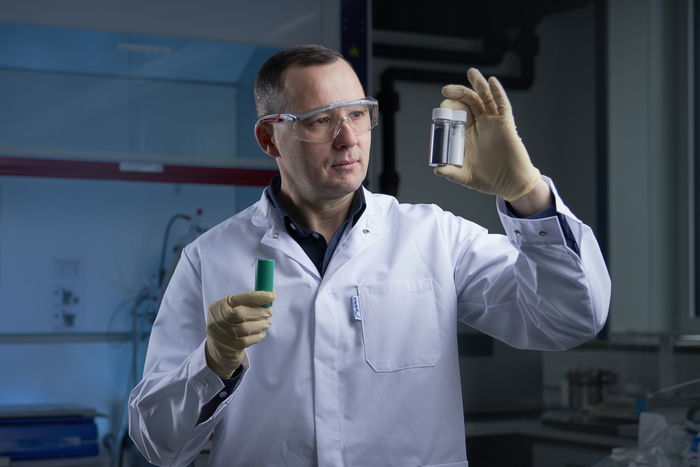Recovering up to 70 percent of lithium from battery waste without corrosive chemicals, high temperatures, and prior sorting of materials being required: This is achieved by a recycling method developed by Karlsruhe Institute of Technology (KIT). The method combines mechanical processes with chemical reactions and enables inexpensive, energy-efficient, and environmentally compatible recycling of any type of lithium-ion batteries. The results are reported in Nature Communications Chemistry (DOI: 10.1038/s42004-023-00844-2).

Credit: Amadeus Bramsiepe, KIT
Recovering up to 70 percent of lithium from battery waste without corrosive chemicals, high temperatures, and prior sorting of materials being required: This is achieved by a recycling method developed by Karlsruhe Institute of Technology (KIT). The method combines mechanical processes with chemical reactions and enables inexpensive, energy-efficient, and environmentally compatible recycling of any type of lithium-ion batteries. The results are reported in Nature Communications Chemistry (DOI: 10.1038/s42004-023-00844-2).
Lithium-ion batteries are omnipresent in our life. They are not only used for wireless power supply of notebooks, smartphones, toys, remote controls, and other small devices, but also are the most important energy storage systems for the rapidly growing electric mobility sector. Increasing use of these batteries eventually results in the need for economically and ecologically sustainable recycling methods. Presently, mainly nickel and cobalt, copper and aluminum, as well as steel are recovered from battery waste for reuse. Lithium recovery still is expensive and hardly profitable. Existing recovery methods mostly are of metallurgical character and consume a lot of energy and/or produce hazardous by-products. In contrast to this, mechanochemical approaches based on mechanical processes to induce chemical reactions promise to reach a higher yield and sustainability with a smaller expenditure.
Suited for Various Cathode Materials
Such a method has now been developed by the Energy Storage Systems Department of KIT’s Institute for Applied Materials (IAM-ESS), the Helmholtz Institute Ulm for Electrochemical Energy Storage (HIU) established by KIT in cooperation with Ulm University, and EnBW Energie Baden-Württemberg AG. It is presented in Nature Communications Chemistry. The method reaches a lithium recovery rate of up to 70 percent without corrosive chemicals, high temperatures, and prior sorting of materials being required. “The method can be applied for recovering lithium from cathode materials of various chemical compositions and, hence, for a large range of commercially available lithium-ion batteries,” says Dr. Oleksandr Dolotko of IAM-ESS and HIU, the first author of the publication. “It enables inexpensive, energy-efficient, and environmentally compatible recycling.”
Reaction at Room Temperature
The researchers use aluminum as reducing agent in the mechanochemical reaction. As aluminum is already contained in the cathode, no additional substances are required. The method works as follows: First, the battery waste is ground. Then, this material reacts with aluminum to metallic composites with water-soluble lithium compounds. Lithium is recovered by dissolving these compounds in water and subsequent heating to make the water evaporate. As the mechanochemical reaction takes place at ambient temperature and pressure, the method is highly energy-efficient. Another advantage is its simplicity, which will facilitate use on an industrial scale, as large amounts of batteries will have to be recycled in the near future already.
Original Publication (Open Access)
Oleksandr Dolotko, Niclas Gehrke, Triantafillia Malliaridou, Raphael Sieweck, Laura Herrmann, Bettina Hunzinger, Michael Knapp, & Helmut Ehrenberg: Universal and efficient extraction of lithium for lithium-ion battery recycling using mechanochemistry. Communications Chemistry, 2023. DOI: 10.1038/s42004-023-00844-2
https://doi.org/10.1038/s42004-023-00844-2
More about the KIT Center Materials in Technical and Life Sciences
More about the KIT Energy Center
Being “The Research University in the Helmholtz Association”, KIT creates and imparts knowledge for the society and the environment. It is the objective to make significant contributions to the global challenges in the fields of energy, mobility, and information. For this, about 9,800 employees cooperate in a broad range of disciplines in natural sciences, engineering sciences, economics, and the humanities and social sciences. KIT prepares its 22,300 students for responsible tasks in society, industry, and science by offering research-based study programs. Innovation efforts at KIT build a bridge between important scientific findings and their application for the benefit of society, economic prosperity, and the preservation of our natural basis of life. KIT is one of the German universities of excellence.
Journal
Communications Chemistry
DOI
10.1038/s42004-023-00844-2
Method of Research
Experimental study
Subject of Research
Not applicable
Article Title
Universal and efficient extraction of lithium for lithium-ion battery recycling using mechanochemistry
Article Publication Date
28-Mar-2023
COI Statement
The authors declare no competing interests.




